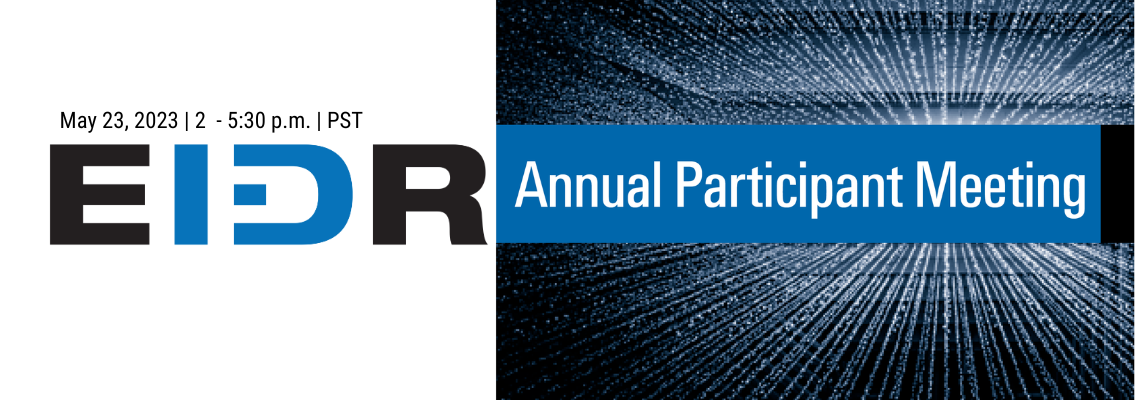The Entertainment Identifier Registry (EIDR) Board of Directors, speaking May 23 during the EIDR Annual Participant Meeting (APM) at the Hollywood Innovation and Transformation Summit (HITS) at The Culver Theater, discussed plans for the global expansion of EIDR and the opportunities that presents.
Also on the agenda was the Cloud Localisation Blueprint initiative and the potential it offers.
The panel also explored Google Search’s inclusion of the EIDR registry in its algorithm and Filiz Bahmanpour, VP of product at metadata provider Gracenote, was welcomed to the EIDR board.
The Nielsen division has been “just connecting with our customers, doing a deep dive with them, for their current and future needs,” according to Bahmanpour. “A lot of positive conversations are in progress. We had our technical team meeting most recently, as well as basically my first board meeting a couple weeks ago. “This is just momentum picking up for us.”
Moderator Hollie Choi, EIDR managing director, asked Bahmanpour how she saw Gracenote’s involvement with the EIDR community.
“We’re basically looking to collaborate and streamline the supply chain for the EIDR community, for our customers and the industry at large,” Bahmanpour said. “Some of the opportunities are immediate and obvious, and some are going to take time and work and collaboration for sure.”
 She explained: “Just to give an example, we certainly started receiving requests around EIDR mapping” to TMS IDs or Gracenote IDs and, in certain cases, basically Nielsen performance linkages.”
She explained: “Just to give an example, we certainly started receiving requests around EIDR mapping” to TMS IDs or Gracenote IDs and, in certain cases, basically Nielsen performance linkages.”
Gracenote also hopes its “expertise in that area is going to be helpful to the EIDR community,” she noted, adding: “We are planning to add EIDR to some of the products we provide to the industry…. One of those opportunities [is the] Gracenote distribution system,” “the system that content owners used to take advantage of the Gracenote products from ID mapping to metadata enrichment to analytics products and access to really Gracenote’s, extensive distribution and discovery network…. Going back to Gracenote’s expertise, we really enable, with our standardised datasets and tech taxonomies, we basically empower the content distribution and discovery space.”
Meanwhile, some Gracenote tools power “upstream development stages,” she said, explaining: “Our data is used by studios and entertainment companies to drive what to develop, who to attach, who to finance with and where to distribute. So essentially, those areas will be helpful to integrate with EIDR eventually, in the future.”
Alignment with the industry
Next, Choi asked Ronda Haralson, technical operations, director, global title management at NBC Universal, “where your head is at on alignment with the industry at large and kind of what you guys are doing?”
Haralson said NBC Universal has been looking at how its titles are dispersed throughout the industry and how IDs and metadata follow the studio’s content as its being distributed and viewed. That lends the studio to identify how it can create more synergy and alignment across the industry.
She added: “As we look at our metadata and our content out in the world, we’re finding that there’s a lot of opportunities to have industry standards to help with a lot of our goals and strategies that we’re trying to achieve … . And I think industry alignment is going to be really important in getting that.”
Her company also sees maintaining its brand as important, especially because there are now “so many different ways for consumers to take in your content,” she said. “You really want to be able to see our branding aligned with our content, and having some of our descriptive metadata be able to be aligned there too. So I think there’s opportunities for our branding to continue to be out in the space as well.”
The rise of metadata
“I think what’s really interesting is that, as we’re hearing everybody’s use cases, I think historically a lot of the challenges have been we’ve been really focused around the right side of the supply chain – so the delivery side of stuff,” according to Greg Geier, SVP of digital media supply chain strategy and operations at Sony Pictures Entertainment.
He thought back to the time when “we were transferring from tape to going more digital,” and his boss at the time “ran into my office, did this fly-by thing that he always did, and stopped and said, ‘OK, metadata. It’s a word. Look it up…. It’s going to be a thing.’”
“I think what’s really been interesting is that the further up you go where you can capture it as close to the camera as possible, it’s reaping the most amount of benefits,” he said. Now the “metadata effort has become broader and more people understand it.” In comparison, in years past, “you walked into some rooms … [and] said metadata and you were the nerd in the room.”
 Metadata has “become part of our life because of just how the consumer products have become part of our life and they understand it more,” he went on to say. “So it’s becoming much more realistic. It’s easier to talk about. It’s easier to let people understand about search and when you go and find your movie on X streaming service, this is the metadata we’re talking about.”
Metadata has “become part of our life because of just how the consumer products have become part of our life and they understand it more,” he went on to say. “So it’s becoming much more realistic. It’s easier to talk about. It’s easier to let people understand about search and when you go and find your movie on X streaming service, this is the metadata we’re talking about.”
Google’s ‘invested’ in EIDR
“One of the key terms that we use here at Google is supporting your content with enough metadata to make it searchable and discoverable across all of our platforms,” including search, Google TV and Google Play, according to Jason Pena, program manager at Google, the only panelist who spoke remotely.
“When you think about our ecosystem, of how we promote and drive engagement to your content, it’s important that we have a ubiquitous identifier that represents that title so that we can leverage that title in multiple surfaces,” he explained.
“We, as a retailer, we’ve cut our teeth with EIDR on the transactional side,” he went on to tell attendees. “We infused it as part of our avail, making sure that the … avail spec supported EIDR.”
Now, he added: “We leverage EIDR heavily to reconcile that data automatically. And now we’re starting to see obviously, with the emergence of SVOD in a major way for Google, those same entities are appearing on our Google TV platform and still suffering from some of the metadata connections that we need to really make that title appear ubiquitously across all of our platforms…. So that’s kind of the reason why Google is invested in EIDR.”
The Hollywood Innovation and Transformation Summit event was produced by MESA in association with the Hollywood IT Society (HITS) and presented by Amazon Studios Technology, with sponsorship by Fortinet, Genpact, Prime Focus Technologies, Signiant, Softtek, Convergent, Gracenote, Altman Solon, AppTek, Ascendion, Coresite, EPAM, MicroStrategy, Veritone, CDSA, EIDR and PDG Consulting.

